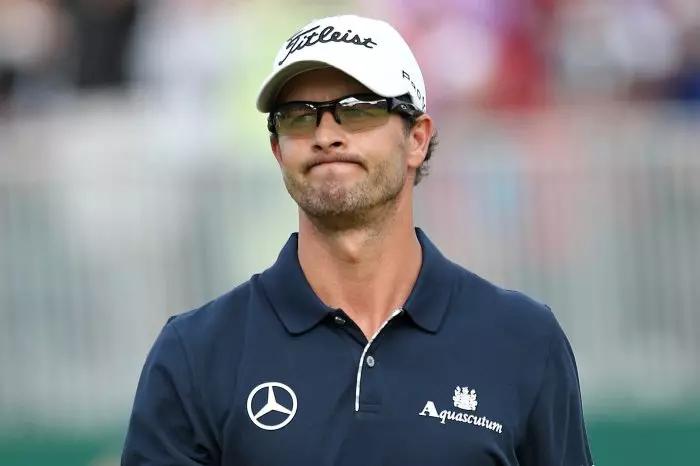When Adam Scott blew an 'unassailable' lead at the 2012 British Open

Adam Scott was set to make history for Australia in the 2012 British Open at Royal Lytham & St Annes, but instead his home stretch collapse went down in golfing history.
Adam Scott had always appeared destined for Major Championship glory.
A six-foot tall surf dude with dazzling good looks and a Tiger Woods-like swing, he turned professional shortly after the start of the 21st century and wasted little time proving himself.
He tasted early victories on the European Tour and successfully transferred his talents to the PGA Tour.
Scott seemed all set to follow in the footsteps of his great hero Greg Norman.
Unfortunately, in the 2012 British Open at Royal Lytham & St Annes, he did just that, but not in the manner he would have wished.
Aussie prodigy
Rewind 12 years and a wait of more than a decade for a first Major win seemed impossible to imagine as Queenslander Scott took to the European Tour like a fish to the Great Barrier Reef.
In 2000 he'd earned a full card in just eight starts and then kicked off the 2001 season with a maiden victory in the Alfred Dunhill Championship.
The following season he added the Qatar Masters, finished top ten on his Masters debut, and then claimed the Scottish PGA Championship at Gleneagles by no less than ten shots.
There was yet another win in Europe in 2003 (the Scandinavian Masters), a first win on the PGA Tour at the Deutsche Bank Championship and he also lost to Woods in the semi-final of the World Golf Championship World Match Play.
The trajectory continued to head skyward the following year as he became, at 23 years of age, the youngest-ever winner of the Players' Championship, the self-anointed fifth major.
While he continued to win around the world, and even add the PGA's Tour Championship in 2006, a worrying trend was establishing itself at the very highest level.
Indeed, throughout his first decade as a professional, Scott would complete only four top ten finishes in the Majors, his record in the WGC was little better, and in 2009 he even dropped out of the world's top 50.
Second wind
The recovery began in 2011, starting with a taste of contending for Australia's first Green Jacket at the Masters before finishing tied second with compatriot Jason Day.
Later that summer he won the WGC Bridgestone Invitational before adding two more Major Championship top ten finishes at the end of 2011 and start of 2012.
In his final start before heading to Lytham, Scott finished third at the AT&T National.
"The purpose of coming here was to get a result before the Open and build up a bit of confidence," he said. "I think I've done that."
He also had a secret weapon: Tiger Woods' ex-caddie Steve Williams had been on his bag on and off for a couple of years and was traveling to England.
Scott's record in the British Open was far from impressive with just the one top 10 in 12 starts and that was a mere tied eighth, but Williams had a good feeling because he knew it was the Aussie's favorite tournament.
The rise
When he carded rounds of 64-67-68 to open up a four-shot 54-hole lead Scott felt vindicated.
"This is the culmination of everything I've done over the last couple of years," he said.
"This is the path I've been going down and I've been close to this all year."
His advantage was great, but he was also well aware that he was being hunted by a pack of high-quality performers, four of them already major championship winners.
Graeme McDowell and Brandt Snedeker were tied second, Tiger Woods alone in fourth, Ernie Els and Zach Johnson were tied fifth.
"It's a great leaderboard and the course is a big challenge too," Scott said. "We didn't see anyone go really low today, so that's comforting to me."
He added that there were three factors in his favor.
"If I play well, it will be hard for someone to shoot 63 or 64.
"I've also got a pretty good record from having the lead. Throughout my career somehow I've been able to handle that situation fairly well most of the time.
"And it's a benefit to have a guy like Steve, any experienced caddie on the bag."
The fall
Just 24 hours later Scott seemed to be proving himself correct.
He still led the British Open by four strokes and now there were only four holes left to play.
Of those golfers chasing him, none had threatened to shoot 63 or 64.
Ernie Els was performing best, holing for birdie on the final hole for a 68, but it seemed too little too late.
And then everything changed.
Scott, who had cried when watching his hero Norman collapse at the 1996 Masters, was about to suffer an appalling deja vu-like nightmare of his own.
He made bogey at the 15th.
Then also at the 16th.
Another at the 17th.
And finally a fourth in a row on the 18th to lose by one.
The aftermath
"I can't justify anything that I've done out there," he said afterward. "I didn't finish the tournament well today."
Drained by the experience he then graciously accepted one final question from the media.
"Can I ask you about your local connections," a voice asked. "Did your grandmother have a house overlooking the course?"
There was laughter in the room and Scott himself joined in.
"My grandmother was from Wales, actually, but my dad's aunt lived behind the ninth green once," he said with a smile. "That's the best I've got for you."
He was beaten on the golf course that day in 2012.
But with those words, Scott had proved himself a winner off it.
